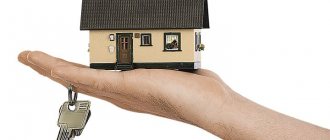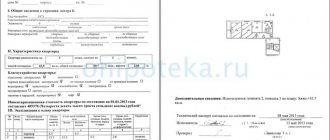The privatization of a cooperative apartment belongs to the category of controversial topics and one can hear a variety of opinions about the need for such a procedure. To avoid misunderstandings, you should learn about the features of registering ownership of this type of housing.
What does cooperative status mean?
The concept of “cooperative” housing first appeared in the 80s. Obtaining an apartment from the state became a long and tedious process, so many Soviet citizens preferred to resolve their housing issues by joining housing construction cooperatives, or ZhSK for short. To receive a cooperative apartment, a person had to become a member of such an organization and undertake obligations to regularly make share contributions.
The mechanism for acquiring housing in this way had the following features:
- Payment of shares began long before laying the foundation of the house;
- Only existing members of the cooperative could become owners; in practice, they were often only spouses;
- The process of full repayment took many years;
- Payment of all share contributions meant the possibility of obtaining the right to real estate owned by a group of citizens called shareholders;
- Often shares were paid after moving into the premises.
The process of final payment of all shares in relation to a cooperative apartment could take 20 years or more, which is comparable to the duration of modern mortgage lending. The difference was that Soviet citizens had small but stable salaries. This situation gave them confidence in the future.
Conceptual apparatus
Cooperative housing is real estate that appeared at the end of the last century, when citizens, tired of waiting for the state to allocate living space, began building them at their own expense.
At this time, the concept of housing construction cooperatives arose, which included shareholders who invested in construction.
Housing cooperatives operated on the basis of local documents regulating their activities. The apartment building was the property of this organization, and its members became the owners of the square meters of a specific apartment after full payment of the share.
Thus, cooperative housing has nothing to do with the state, but belongs to the owners’ association.
Find out from our articles about how to privatize an apartment under a social tenancy agreement, as well as whether it is possible to privatize housing with debts or registered minor children, and how to refuse to participate in the procedure. You can sample an application for privatization of an apartment.
Is privatization of cooperative housing necessary?
Privatization refers to the process of transferring residential property from the state or municipal fund. As a result of using such a mechanism, real estate changes its owner and becomes private property. The procedure involves strict regulation and the need to fulfill certain requirements, subject to which the possibility of transferring housing to a citizen becomes available
The cooperative apartment has never had the status of public housing, so it is fundamentally wrong to initially talk about the need to go through the privatization procedure. The rights to such an object belonged to a group of shareholders or a specific partnership of owners, which makes it impossible to talk about private property. A cooperative participant became a so-called owner only after paying the entire amount of share contributions.
According to the current rules, a citizen acquires ownership rights only after passing all stages of state registration and receiving supporting documents. The fact of payment of the share does not provide the opportunity to freely dispose of the cooperative apartment.
Such a restriction imposes a ban on all types of property transactions:
- sale;
- donation;
- exchange;
- donation.
The status of the apartment directly affects not only the possibility of privatization, but also the scope of rights that family members receive. When living under a social tenancy agreement, the tenant and his relatives living and registered in the apartment can participate in the procedure for obtaining free housing. The participation of minor children in the process in this case is considered mandatory.
In the situation with a cooperative apartment, everything is different. We are not talking about privatization, but only about registration of ownership rights, which can only be obtained by the shareholder or his spouse. The other half can become the owner only if there is a legal marriage. In this case, it is considered that the contributions were paid from the family budget.
In the case of a cooperative apartment, neither natural children nor other close relatives receive the right to own housing even at the time of repayment of obligations. In some cases, the charters of cooperatives allowed the transfer of a share to one of the family members.
Proportion of children
Until the cooperative apartment has been privatized, the children of the shareholder do not have any rights to it, even if they are registered in it. After registration of rights, the owner, at his own discretion, can donate the apartment to his children or otherwise dispose of it. The rules on the mandatory allocation of shares to minors, as during privatization or maternity capital, do not work here.
Be sure to read it! What responsibility does the perpetrator bear for contracting HIV infection?
Where to start designing
Ownership does not automatically appear, so initiative and a certain sequence of actions are required on the part of a person.
Regarding a cooperative apartment, the following nuances should be clarified:
- The volume of the paid share contribution, whether it was repaid in full or in part;
- Is there a package of necessary documents?
In a situation where the cooperative is dissolved and there are no documents, you should contact the legal successor of the organization to obtain them. In most cases, it became the homeowners' association, but it is not always able to provide documents confirming the fact of full repayment of the share for the cooperative apartment.
In this case, it is necessary to contact Rosreestr or the local administration and clarify the location of the archival documents of the dissolved cooperative. Data about its members may be stored in the housing department or other structure that is responsible for housing or construction issues.
Step-by-step instructions in 2020
There is a misconception among ordinary citizens that if share payments for a cooperative apartment were paid in full before 1997, then there is no need to go through the procedure of registering ownership rights. This circumstance is largely due to the fact that it was this year that housing legislation underwent significant changes and an official body was created in the form of the Unified State Register of Real Estate. Today, all property transactions must go through him only.
The misconception regarding the registration of ownership rights to a cooperative apartment is due to the fact that when paying a share before 1997, a citizen can use a simplified procedure. To do this, he needs to contact the BTI and issue a technical inventory certificate. Experts, however, recommend involving a mechanism for registering ownership rights to a cooperative apartment through a government agency.
The procedure for transferring cooperative housing into private ownership involves going through the following main stages:
- Preparation and collection of necessary documents regarding housing, members of the cooperative and payment of share contributions;
- Submitting a package of papers to Rosreestr;
- Completion of the procedure and receipt of supporting documents.
To submit a document, you can use the services of the MFC. To do this, it is recommended to take a ticket in advance, which will avoid waiting in line. In some regions, there is a service for electronic submission of documents through the functionality of a personal account on the Rosreestr website, but for this, the citizen must have an enhanced digital signature.
What documents will be required
To register ownership of a cooperative apartment, you will need to collect documents, after which you can contact the MFC to write an application and initiate the procedure.
The main papers include:
- certificate of full payment of all shares;
- technical documents for the premises;
- confirmation of membership in the cooperative;
- extract from the house register;
- ID card of all family members;
- marriage certificate and documents for children.
The complete package of documents depends on the specific circumstances, so other types of documents may be required. In most cases, additional certificates confirm the status of a housing cooperative in the form of protocols, constituent documents and technical documentation for a multi-apartment cooperative building.
From a legal point of view, using the term “privatization” in relation to cooperative housing is incorrect. The lack of status of an apartment as belonging to a state or municipal fund is the main obstacle to the possibility of obtaining ownership of it as part of the procedure for obtaining free housing. The right to own the premises arises only on the basis of documents received after passing the main stages of standard registration of the transaction.
How to privatize a cooperative apartment?
A resident can obtain rights to cooperative living space if the following conditions are met:
- having membership in a cooperative;
- full repayment of the share contribution;
- absence of debts on utility bills.
One apartment in a housing cooperative may have one share (clause 1 of Article 112 of the Housing Code of the Russian Federation), but several people can be the owners of the share, and their rights to the apartment are distributed in equal shares.
A member of a housing cooperative loses the right to privatize housing in a housing cooperative, regardless of the amount of share payments made in the event of a gross violation of the charter of the cooperative or housing legislation (clause 3 of Article 130 of the Housing Code of the Russian Federation), for example, systematic non-payment of share contributions or utility bills.
For violations of the charter, the tenant is expelled from the housing cooperative with eviction from the apartment, and the contributed part of the share will be returned within two months from the date of expulsion.
List of documents
To privatize cooperative housing, the following documents will be required:

- certificate of redemption of the share from the accounting department of the housing cooperative;
- an extract from the minutes of the meeting on the right of this shareholder to living space;
- certificate of persons registered in the apartment;
- technical certificate;
- cadastral document;
- receipt of payment of the duty (2000 rubles);
- copies of passports of all shareholders.
If the share was paid out before the beginning of 1998, then a certificate of redemption is requested from the local branch of the BTI. The minutes of the housing cooperative meeting, at which living space is distributed among shareholders in accordance with the share contributions made and signed agreements, is the basis for obtaining rights after payment of the share (clause 1 of article 124 of the Housing Code of the Russian Federation).
Technical and cadastral passports are issued by BTI employees after receiving permission to put the house into operation. To obtain these documents, you must call BTI employees to take measurements of the premises and prepare documents.
The cost of services will range from 1000 to 5000 rubles, depending on the size of the premises and the region where the service is received.
Upon receipt of membership in a cooperative after marriage, the housing is privatized into joint ownership of the spouses and a marriage document is attached to the documents.
If a tenant privatizes an apartment first of all shareholders of this housing cooperative, then the following documents must be attached to the above documents:
- copies of the constituent and statutory documents of the housing cooperative;
- permission to put the house into operation;
- documentation for the site under the house;
- a list of members of the housing cooperative by name indicating their shares.
Constituent documents and extracts from the minutes are ordered from the board of the housing cooperative, and permission to put the house into operation can be obtained from the town planning committee of the local administration.
These documents are submitted to Rosreestr only by the first shareholder who registers the rights to housing in the cooperative.
How to get sick leave at a clinic - all the answers to this question are in our article! Business trips made on weekends are paid according to a special scheme. You can read more about this in our article.
What is more profitable for working pensioners to work or retire in 2020? Our material will help answer this question.
Procedure
Privatization of cooperative housing is generally carried out as follows:
- After putting the house into operation, the shareholder draws up cadastral documents.
- The share contribution is repaid over several years.
- After full repayment of the contribution, the shareholder collects documents for the apartment and applies to Rosreestr with an application to register the rights to the apartment.
- After consideration and a positive decision, information about the new owner is entered into the USRN database.
The application sets out a request for registration of rights to living space on the basis of full repayment of the share contribution.
The text must contain the following information:

- Full name and passport details of the applicant;
- list of persons living together;
- the amount of the repaid contribution;
- address and area of living space.
Application form here.
The application is verified by Rosreestr employees within 5 working days. A refusal may be received if the cooperative was formed with violations or the applicant provided an incomplete package of documents.
If the decision is positive, the right to the apartment is issued within 5-7 days, after which the shareholder can receive from the MFC an extract from the Unified State Register of Real Estate, indicating ownership of the apartment.








